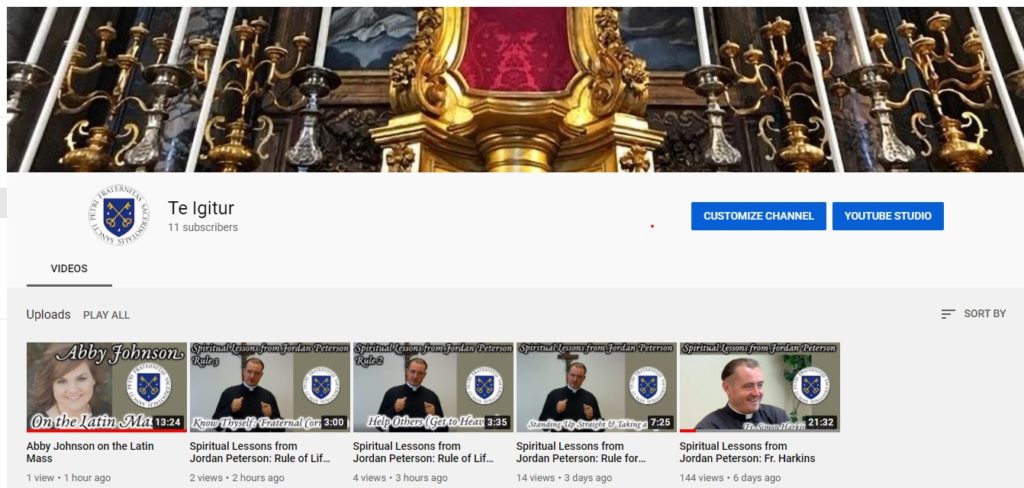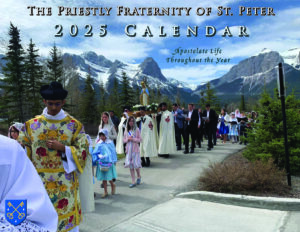Introducing Te Igitur: the FSSP’s new YouTube Channel
We are delighted to share with our FSSP family a brand new YouTube channel that will not only edify and uplift fans of the Fraternity, but also help us reach many, many more souls throughout the wider Catholic world and beyond.
Come join us over on Te Igitur as Fr. Simon Harkins, FSSP dives into the 12 Rules for Life written by psychologist Dr. Jordan Peterson, showing us how to transform the purely natural virtues into supernatural boosts to your spiritual life. Also don’t miss part 1 of our podcast with pro-life leader Abby Johnson, who talks to us about how her recent discovery of the Latin Mass reinvigorated her faith.
You’ll also find links to great playlists from our priests and our various apostolates, like Q&A with Fr. James Fryar, lectures on Genesis and Job from Fr. Dominic Savoie, and more!
Look forward to more great content in the weeks to come, including more of Fr. Harkins and Abby Johnson, interviews with FSSP priests and parishioners, talks on current issues and ideas, and the inspirational spiritual advice we need now more than ever.
So take a much-needed break from the chaos of the news and the clickbait of the scandalmongers, and join us as we lift our hearts to God and keep right on doing what we’ve always done–help people get to heaven.
August 31, 2020

Pick Your Battles
All of us have two enemies to combat within ourselves: pride and concupiscence, and both serve to render us blind to goodness and to ourselves.
But even though they are linked, both are not equal in importance.
Pride is far worse, and it is for this reason that we see our Lord condemning it in more decisive terms than sins of the flesh: He who exalts himself shall be humbled, and he who humbles himself shall be exalted (Lk; 14:11). While sins of the flesh can be more apparent and visible (and just as grave), these are not the primal root of evil within ourselves.
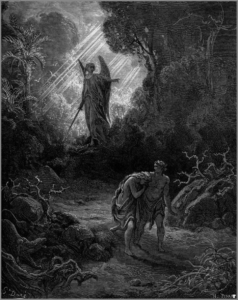 Lucifer and Adam fell on account of pride, a disordered perception of their excellence, trying to appropriate for themselves things that only belonged to God. But in the case of Adam, being of flesh and blood, concupiscence would end up being a consequence of the Fall, not the cause.
Lucifer and Adam fell on account of pride, a disordered perception of their excellence, trying to appropriate for themselves things that only belonged to God. But in the case of Adam, being of flesh and blood, concupiscence would end up being a consequence of the Fall, not the cause.
Pride, in its most pure form, seeks to elevate the self above any and all legitimate authority and restriction. If it goes unchecked, eventually any claim to submission is met by increasing hostility and rebellion.
In Lucifer’s and Adam’s attempts to “be like God,” they looked on the harmony and order imposed on them by God, which came by way of nature and a command, as something they deserved to define for themselves. Instead of using their liberty to observe the order God put in place out of love, to respond in a way that gives them true self-expression, it degraded into arbitrary license and utilized to access some false claim to dominion.
Just as a locomotive can express itself either by riding properly on the track or by exploding, so we now witness the explosion and polarization of our society, locked in war with itself.
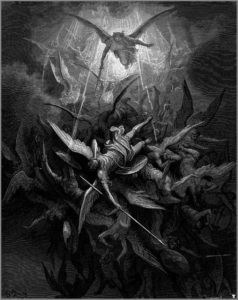 On one side are those who endeavor to respect God’s plan, to acknowledge His existence and His authority, that law and order in society and nature are an expression of His will, and who should rightfully expect others to do so.
On one side are those who endeavor to respect God’s plan, to acknowledge His existence and His authority, that law and order in society and nature are an expression of His will, and who should rightfully expect others to do so.
On the other are those who seek quite the opposite, so much so that as evil is embraced, the blinder they become, and the more dangerous.
Nothing is left sacred and nothing will be spared the chopping block of re-definition: life, liberty, traditions, marriage history, language, holy religion, and nature itself. It is yet another cry of Lucifer’s Non serviam, but always with the same response for those who take the opposing side: the Cross of Christ, from where we learn humility and gain fortitude to resist with the assurance of victory.
Maybe the reason we see so many unhappy people rioting and demonstrating nowadays is because they have been mobilized and distracted to fight the wrong war and, as a result, are losing the war that they are supposed to win.
August 27, 2020

Make Your Voice Heard! New Latin Mass Survey
Here’s a chance to make your voice heard about the Latin Mass as well as your TLM parishes and communities.
The Christus Vincit Foundation is running a nationwide survey on the growth of the Latin Mass in the United States.
From their website:
“Christus Vincit exists to restore the primacy of God in the natural order. We seek, through prudent financial gifts, to assist traditional Catholic parishes strengthen belief in the supernatural through the restoration of sacred liturgy and beauty.”
“The Traditional Latin Mass (TLM) is experiencing a resurgence in the United States. Across the country, new parishes, communities, and orders are forming to meet the growing demand for traditional forms of worship. The Christus Vincit Foundation is interested in hearing how you are involved and contributing to the growth of your parish, community, and the spread of the Traditional Latin Mass in America.”
Take the Survey
August 20, 2020

New FSSP Youtube Channel Launching August 31st
We have some exciting news to share with our FSSP family…we are putting together a brand new Youtube channel!
As the world turns darker and Holy Mother Church faces increasing challenges, the Priestly Fraternity of St. Peter stands in medio ecclesiae–in the midst of the Church–keeping the flame of tradition alive and offering that flame to an ailing world, that all people everywhere might know the light of the risen Christ.
We are creating a space in the international media to serve all mankind just as we have always served our parishioners: to help people go to heaven.
In this new channel, we will be bringing a Thomistic and traditional perspective to the issues of the day. What is at the root of our society’s devaluation of children? How does Catholic teaching align with the ideas of leading traditional and conservative thinkers such as Sir Roger Scruton or Dr. Jordan Peterson? How can young men find direction and be lifted from hopelessness to energetic action? How can busy homeschooling moms turn their ordinary actions into prayer?
Join Fr. Simon Harkins, FSSP and Director of Communications Claudio Salvucci as we begin the conversation on August 31st, featuring Abby Johnson talking about her pro-life work and her recent discovery of the beauty of the sacred liturgy.
August 18, 2020

Annual Appeal Update
As the U.S. Postal Service is currently experiencing delays and other issues, those receiving our Annual Appeal in the mail may wish to give to the Fraternity online instead. If you would like to exercise that option, just follow the link for our donation page below. May God bless you for your support!
https://fssp.com/annual-appeal/

Immaculate Heart in the Valley of the Sun
At the northern reaches of the Sonoran desert, Phoenix is known for blazing hot summers. This year, however, thanks to parishioners of our Mater Misericordiae apostolate, the Valley of the Sun will be blazing with renewed spiritual light as well.
Parishioner Laura had been wondering what we could do as lay Catholics to counteract the social violence and church attacks occurring throughout the country, when she heard a Catholic podcast that mentioned taking out billboard space. She began asking around to gauge interest for the project, and the idea struck a chord with her fellow parishioners.
While praying before her home altar, Laura was struck by the thought of the Immaculate Heart of Our Lady and the corresponding prayer “Immaculate Heart of Mary, pray for us.”
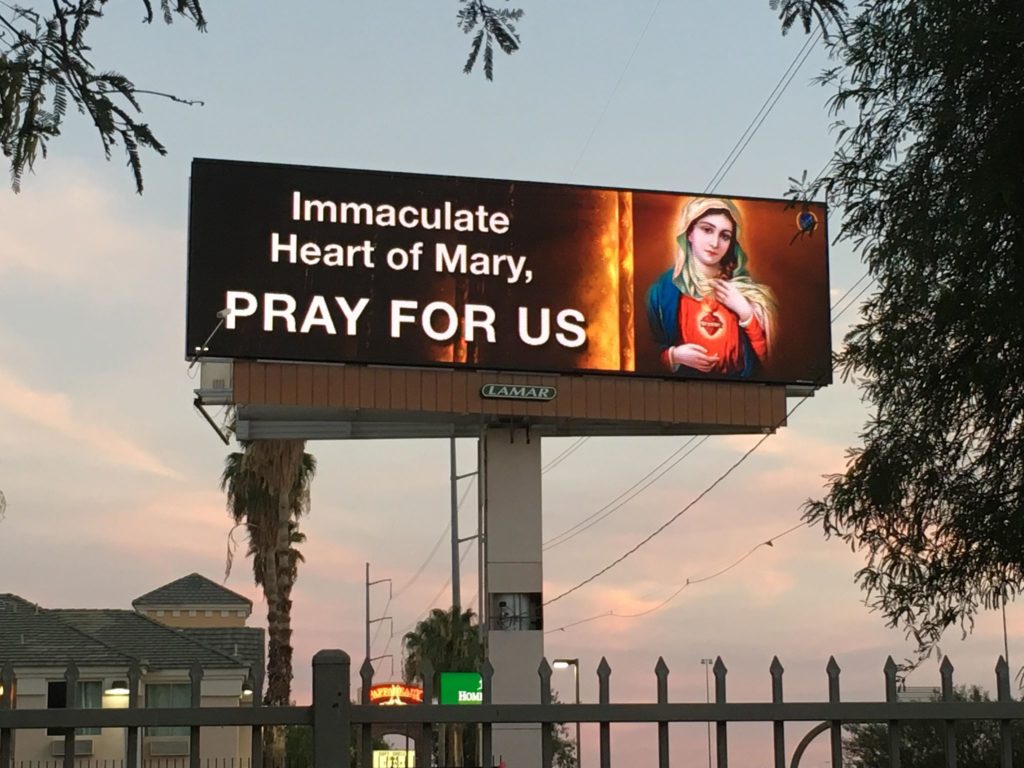
“I pictured the board in my mind almost exactly as it is designed,” she said. “This was in mid-July. At the time I didn’t consider that August is the month of the Immaculate Heart, but I felt strongly that if we were to put up a sign, it would be this.”
The initiative is meant to be an act of public reparation for the blasphemies committed in the attacks on our statues and churches, and it is also an act of public prayer, calling on the Blessed Mother for help in this time of distress.
“Everything fell in place very quickly and successfully,” Laura told the Missive. She immediately received a great outpouring of contributions and support from two parishioners who offered their expertise in design and in sales.
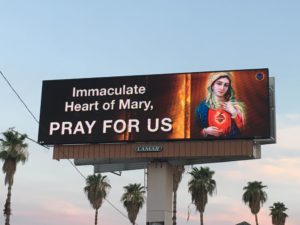 It seems that Providence has looked very favorably upon this project. Based on their fundraising projections, their initial purchase was for a modest 3 billboards only. But in the span of a week, the parishioners raised so much money that they were able to contract for 10 more—a total of 13 billboards throughout Phoenix celebrating and invoking the Immaculate Heart of Mary.
It seems that Providence has looked very favorably upon this project. Based on their fundraising projections, their initial purchase was for a modest 3 billboards only. But in the span of a week, the parishioners raised so much money that they were able to contract for 10 more—a total of 13 billboards throughout Phoenix celebrating and invoking the Immaculate Heart of Mary.
“For me, this has been an incredible grace and consolation,” Laura said. “I felt Our Lady’s hand in this throughout the whole process.”
Consider this: that directly because of the blasphemous vandalism of a few statues, the image of Our Lady will now appear to thousands upon thousands of commuters throughout the Phoenix area. From a little act of devilry comes a great act of God. The serpent may have struck, yes–but there is a heel already coming down upon its head.
The Valley of the Sun seems to be giving us a little prefigurement of that consoling message of Fatima: that after calamities, wars, and persecutions, after suffering, martyrdom, and the undoing of nations:
“In the end my Immaculate Heart will triumph.”
August 12, 2020

On Sacramental Grace
by Fr. William Rock, FSSP
In order to grow in holiness, frequent recourse to the Sacraments is a necessity. This frequent recourse is usually understood to mean regularly attending Mass, receiving Communion, and going to Confession. This is because every fruitful reception of any of the sacraments, including those which can be received frequently, produces an increase of sanctifying grace and thus draws the recipient closer to God and furthers one’s growth in holiness. In addition to this increase of sanctifying grace which occurs at the moment of the fruitful reception, there are also effects of the sacraments which perdure after their reception. While the sacramental character of Baptism, Confirmation, and Orders are one of these benefits – and probably the most well-known – there is also another benefit which seems to be often neglected.
The perennial Catholic theological tradition tells us that with the fruitful reception of the Sacraments there is conferred on the recipient sacramental grace. According to the old Catholic Encyclopedia, sacramental grace includes “on the part of God, a promise, and on the part of man a permanent right to the assistance needed in order to act in accordance with the obligations incurred” in the reception of the sacrament (Catholic Encyclopedia, s.v. Sanctifying Grace). These promised helps are actual graces. According to the Baltimore Catechism #3 (q. 475), “Actual Grace is that help of God which enlightens our mind and moves our will to shun evil and do good.” While sanctifying grace remains with the individual unless lost by mortal sin, actual graces are passing. God offers actual graces, they are either used or they are not, and then they are gone.
So, with the fruitful reception of the sacraments, one receives a promise to the actual graces to fulfill the end associated with each of the sacraments. By Baptism, one becomes a Christian and is promised in the sacramental grace of Baptism the actual graces to live out a Christian life. By Confirmation, one becomes a soldier of Christ and is promised in the received sacramental grace the actual graces to defend the faith in the public sphere. The sacramental graces associated with the sacrament of Matrimony are promised for being a good and holy spouse and parent, in the sacrament of Orders for being a good and holy Minister of Christ, in Penance for avoiding the sins confessed.
To grow in the spiritual life then, and to receive the aid promised by God for living a Christian life and fulfilling the other ends associated with the sacraments, one should utilize these promised aids, and a way to draw them to oneself is to pray for them. While there is no formal way such a prayer is to be said, and each is free to use his own words, it is good practice that the following four points be expressed.
1. Reminding God that He has promised these aids in the reception of the Sacraments. Not that God has forgotten, for God is perfect. But this is done for one’s own benefit, to remind oneself that God has made these promises and to put one into the proper disposition for the next steps.
2. Admitting to God that one needs these aids. Living a Christian life in general, and living it out according to one’s particular state in life, is difficult. There are challenges and temptation. In relying on one’s own strength, one is prone to failure and sin. One should, rather, “hope in God” (Ps 42:6) and His promises. Additionally, admitting that one needs these aids is an act of humility, an act that acknowledges one’s limitations and the need one has of the help of God. “A contrite and humbled heart, O God, thou wilt not despise” (Ps 50:19). “God resisteth the proud and giveth grace to the humble” (Jam 4:6).
3. Asking God for these promised aids. Even though God knows what one needs – “your Father knoweth what is needful for you, before you ask him” (Mat 6:8) – He may withhold it until one asks. This is because by asking, one places oneself in a more proper relationship with God. While acknowledging that one needs help is an act of humility, asking for help is an act of hope, for it expresses confidence that God is not only capable of fulfilling His promises, but that He will do so. It may be asked, “if God has promised these aids, why does He not just bestow them without one asking?” If God were to give these aids without the individual acknowledging that one needs them and without asking, one might think that the strength comes from oneself and not from Him and this could lead to the growth of the vice of pride. Another reason for why God waits for us to ask for graces is that this gives us the dignity of cooperating with His providence and in the work of our salvation.
4. Asking for these graces to be fruitful in one’s life. As actual graces can be accepted or rejected, one should ask God for His help in accepting them so that one can use them to do good and avoid evil.
To this end, it is suggested that at least once a day, perhaps as part of one’s morning prayers, one should ask God for the aids promised in the sacramental graces of all the sacraments one has received. One is free to use one’s own words, but the four points listed above should all be expressed. By doing so, one will begin to live a Christian life that goes beyond the periodic reception of the Sacraments to one where the Sacraments and their effects permeate one’s life on a day-to-day basis and thus one may the more work out one’s salvation (see Php 2:12) and grow in holiness.
Fr. William Rock, FSSP was ordained in the fall of 2019 and is currently assistant Pastor at Mater Misericordiae parish in Phoenix, AZ.
August 10, 2020

Ordinations 2020: Gold and Blue Down Under
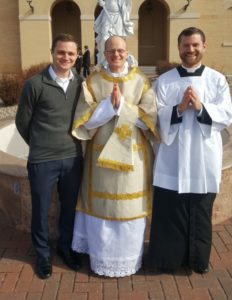 Deacon Thomas Sofatzis, FSSP will be ordained to the sacred priesthood this weekend at St, Mary’s Cathedral in Sydney, Australia, and then offer his First Mass the following day. Readers of the Missive are encouraged to offer their prayers in thanksgiving for this joyous event and for God’s abundant graces to alight on our new priest.
Deacon Thomas Sofatzis, FSSP will be ordained to the sacred priesthood this weekend at St, Mary’s Cathedral in Sydney, Australia, and then offer his First Mass the following day. Readers of the Missive are encouraged to offer their prayers in thanksgiving for this joyous event and for God’s abundant graces to alight on our new priest.
This ordination and first Mass, always occasions for great celebration within the Fraternity, have an added twist in that soon-to-be Fr. Sofatzis will be wearing specially commissioned vestments in the FSSP color scheme of gold and deep blue, made by Altarworthy:
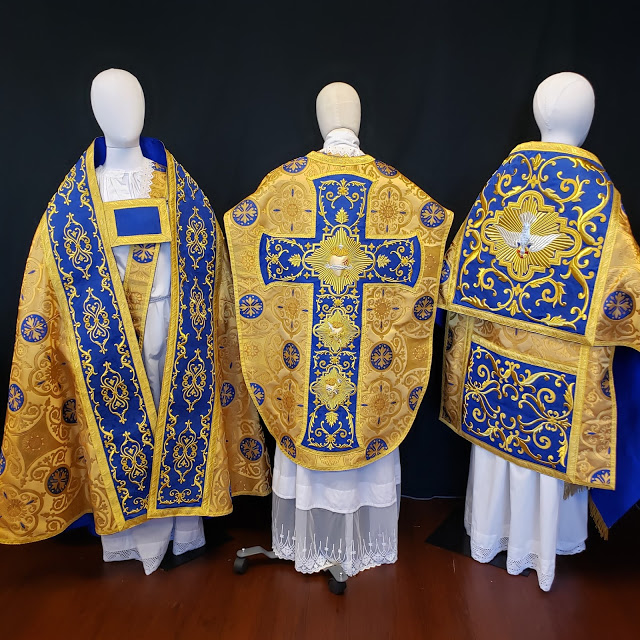
The shield of the cope additionally bears the FSSP’s heraldic emblem: with the crossed keys of St. Peter and three tears.

The ordination will be live-streamed on St. Mary’s Cathedral YouTube channel on August 8th, 10:30 AM Australia time–which for our North American readers will be Friday evening. Check the YouTube page for the exact start time and to set a reminder in your local time zone.
Ad multos annos!
August 7, 2020

Supporting More Workers for the Vineyard
Our North American District Superior Fr. Michael Stinson summed it up in his 2020 Annual Appeal letter, which is now reaching mailboxes across the continent and which you can also read on our website:
“Fraternity priests remain ready to give their lives for you and our faith. When the lockdown forced us to close our churches, we kept the sanctuary lamps burning rearranging our schedules and lives and went to great lengths to attend to the dying, live-stream liturgies, and keep our Lord present in the world.
But quite frankly, my greatest fear is that our hardworking priests are not sufficient to turn the tide of modernism. We must do everything to provide our priests with more help.”
This year we have all learned some pointed lessons about how we spend our time and our resources. Even our most unquestioned worldly assumptions, and seemingly fixed institutions like our workplaces and schools, are suddenly being re-examined to their very essences–and we find ourselves asking if our actions are worth what we put into them.
“Everyone has to choose their priorities. How important is the Fraternity and the ancient liturgy to you?”
Privately and publicly we are hearing from more and more people who are rediscovering the Traditional Latin Mass. Sometimes they even do so over their own preconceived notions of traditional communities, or their own stereotypes and prejudices. But if they can just make that leap, they often find that what they sought most was right in our churches and parish halls.
They find their faith strengthened by the consolation of liturgical beauty, challenged and inspired by the uncompromising truth of the Gospel, and fortified with the bountiful wisdom that 2000 years can offer. They find families who delight in their children and their elderly, and homes whose wealth is measured less by income and consumer goods and more by spiritual fruits and holy charity. And they find wonderful friendships with other devout men and women who have the same desire to follow Our Lord above all else.
Many of us already know the power of the ancient Roman Mass to help us lead these kinds of lives: to strengthen us and light our path through dark and confusing times. But we cannot rest on that knowledge–we are called by Christ to carry that strength and that light out to everyone.
And for that, as Fr. Stinson states, we need more workers for the vineyard:
“Each summer, more men come to Our Lady of Guadalupe Seminary. But even with our recent ‘vocations boom,’ our North American District still finds itself short of priests. Bishops continue to call, requesting new apostolates in their dioceses. Many of our current apostolates could use a second or third priest. “
As you receive your Annual Appeal letters, or as you consider donating online, we humbly ask you to reflect on how the Priestly Fraternity of St. Peter has been a force for good in the world and the Church. Not just for our own parishes, but for hundreds of diocesan and other communities whose priests and even bishops we have helped to recover our sacred Catholic tradition…and all the Catholic laity that these serve in turn.
The need out there is great. Perhaps even too great, in merely human terms. But with full confidence in Our Divine Lord to give the increase, we know that our little prayers and contributions today can yield a hundredfold in eternity.
And seeing the multitudes, he had compassion on them: because they were distressed, and lying like sheep that have no shepherd. Then he saith to his disciples, “The harvest indeed is great, but the labourers are few. Pray ye therefore the Lord of the harvest, that he send forth labourers into his harvest.” – Matthew 9:36-38
August 4, 2020

The Golden Legend of St. Peter’s Chains
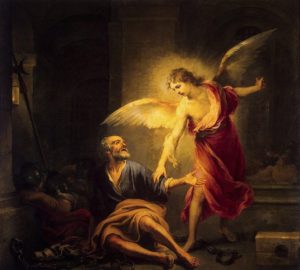 The feast of St. Peter’s Chains on August 1st primarily focuses on the Apostle’s angelic deliverance from his imprisonment by Herod, as recounted in Acts 12. The folklore surrounding the feast also tells of two sets of chains: those used by Herod in Jerusalem, and those used during Peter’s imprisonment under Nero at the Mamertine prison in Rome. Printed below are modernized excerpts from the popular medieval work, the Golden Legend of the Saints, which discusses how the chains were recovered and the feast established in Rome.
The feast of St. Peter’s Chains on August 1st primarily focuses on the Apostle’s angelic deliverance from his imprisonment by Herod, as recounted in Acts 12. The folklore surrounding the feast also tells of two sets of chains: those used by Herod in Jerusalem, and those used during Peter’s imprisonment under Nero at the Mamertine prison in Rome. Printed below are modernized excerpts from the popular medieval work, the Golden Legend of the Saints, which discusses how the chains were recovered and the feast established in Rome.
The Feast of St. Peter ad Vincula, at Lammas
…Pope Alexander, who was the sixth after Peter, and Hermes, provost of Rome, who was converted to the faith by Alexander, were held in prison at different places by Quirinus the judge. The judge said to Hermes the provost:
“I marvel that you, who are so wise a man, would abandon the great worldly honors that you have, and the great riches that you receive from the office of provost, and leave all these things for the dream of another life.”
To whom Hermes said:
“Before now I despised and scorned it, and I supposed there had been none other life than this.”
Quirinus answered: “Prove to me that there is another life, and I shall join myself to your faith.”
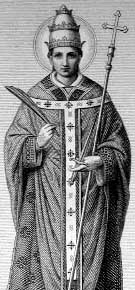
Hermes said: “Alexander, whom you hold in prison, shall inform you better than I.”
But Quirinus cursed Alexander, and said to him: “I want you yourself to prove this thing to me, and instead you direct me to Alexander, whom I have bound in chains for his evil deeds. Now I shall double the guards upon you and Alexander, and I shall set a watch. And if I find you with him or him with you, I will believe that you speak the truth.
Then he doubled their guards and told Alexander. Alexander prayed to God, and an angel came to him and brought him into the cell with Hermes. And when Quirinus came to the cell he found them both together, which caused him great amazement. And then Hermes recounted to Quirinus how Alexander had healed his son and raised him from death.
Quirinus then said to Alexander: “I have a daughter named Balbina who is sick with a goiter. If you can heal her, I promise that I shall accept your faith.”
Alexander replied: “Go then, and bring her to me into my cell.”
And Quirinus said to him: “How can I find you in your cell, when you are here?”
Alexander said: “Go your way, for He that brought me here shall soon bring me back there.”
Quirinus then went and fetched his daughter, and brought her to Alexander’s cell where he found him inside, and then he knelt down at his feet. And his daughter began to kiss the chains with which Alexander was bound, hoping thereby to receive her health.
But Alexander said to her: “Daughter, do not kiss my chains, but seek the chains of St. Peter and kiss them with devotion, and thou shalt receive thy health.”
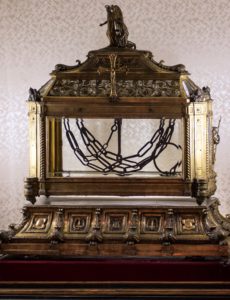
So Quirinus set out to seek the chains of Peter, and these were found. And Alexander bade his daughter to kiss them. As soon as she had done so, she received her health and was all whole. Then Quirinus demanded pardon and forgiveness, and delivered Alexander out of prison, and received holy Baptism: he and all his attendants and many others. Then Alexander established this holy feast to be kept always on the first day of August, and he made a church in honor of S. Peter, where he set the chains and named it St. Peter ad vincula.
And to that church come many people at that solemnity, and the people there kiss the bonds and chains of St. Peter.
…..
The month of August was formerly called Sextilis. The people dedicated and named it after Augustus in honor and remembrance of the victory that the emperor had on the first day of this month. All the Romans kept that day as a great solemnity until the time of Theodosius the emperor, who began to reign in the year of our Lord 426.
At that time Eudosia, daughter of the said Theodosius the emperor, and wife of Valens, went by a vow to Jerusalem. There a Jew gave to her for great love a great gift: the two chains with which St. Peter was bound under Herod. She was overjoyed at this, yet when she returned to Rome she saw that the Romans kept the first day of August in honor of a dead pagan emperor. She was very sorrowful because they gave so much honor to a man who was damned, and she thought that they would not lightly give up this custom. If possible, she wished not to leave the day as it then was, but to remake it instead in honor of S. Peter, that all the people should call it St. Peter ad Vincula.
And she discussed the matter with St. Pelagius the Pope, then declared with fair words that the prince of pagans was now forgotten, and the memory of the prince of the apostles would be kept instead. And this pleased all the people. Then she brought forth the chains that she had brought from Jerusalem, and showed them to the public. Then the pope brought out the chain with which Peter had been bound under Nero, and as soon as that chain touched the others, all three by a miracle were made one, as if they had never been separated.
The pope and the queen thus established that the people’s foolish custom of making solemnity of a pagan, was changed into a better one for St. Peter, prince of the apostles. And the pope and the queen set the chains in the church of St. Peter ad Vincula. And the queen gave to said church great gifts and privileges, and it was established that day to be hallowed over all.
July 30, 2020


